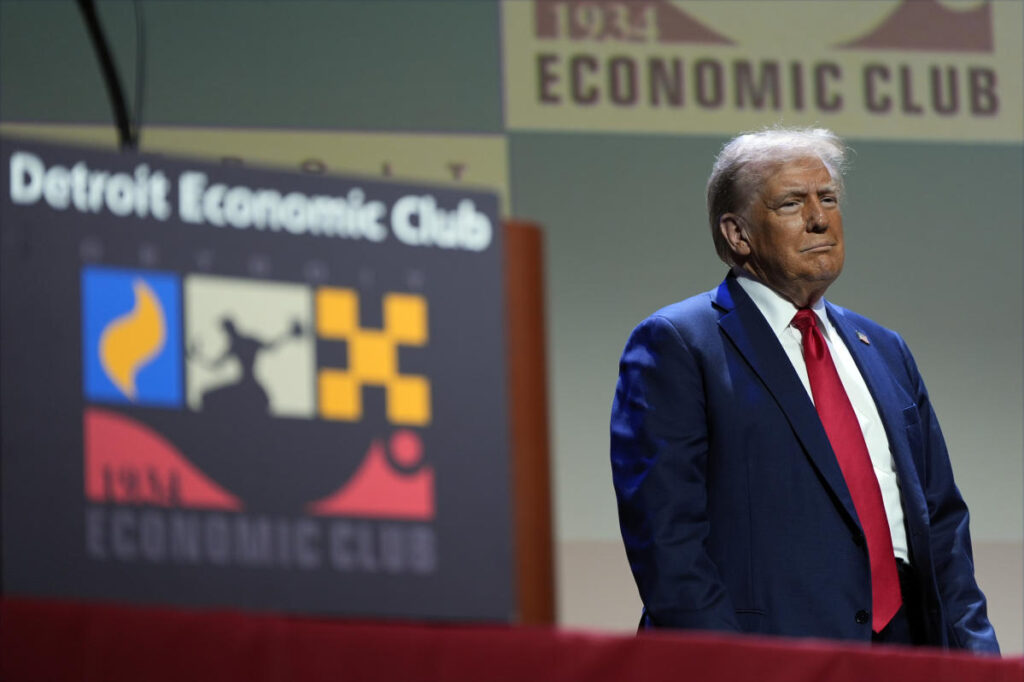In a recent speech at the Detroit Economic Club, former President Donald Trump made headlines with his comments about Detroit, asserting that the entire country would resemble the city if Vice President Kamala Harris were elected. His comments sparked controversy as he described Detroit in a negative light, suggesting it epitomized decline while simultaneously acknowledging it as a “developing” city—a contradiction that drew ire from local Democratic leaders. As Trump spoke to an audience crucial to Michigan’s economy, particularly the auto industry, his remarks were met with swift backlash from officials like Detroit Mayor Mike Duggan, who emphasized the city’s recent successes and distanced its progress from Trump’s influence.
Local leaders were quick to express their discontent with Trump’s statements. Mayor Duggan pointed to Detroit’s improved crime rates and population growth, noting the city’s achievements without federal support from Trump. Moreover, U.S. Representative Shri Thanedar chastised Trump for discussing Detroit negatively, while Attorney General Dana Nessel artfully remarked on the contradictory nature of Trump’s criticisms and overtures—comparing it to someone who insults and then seeks attention. The sentiment echoed throughout the Democratic leadership of Michigan, including Governor Gretchen Whitmer, who highlighted that Detroiters would remember Trump’s remarks come election time.
Trump’s campaign responded to the criticism by blaming the city’s past struggles on “globalist policies” advocated by Harris, which purportedly contributed to manufacturing jobs fleeing the United States. Victoria LaCivita, Trump’s Michigan communications director, claimed that the economic policies he would implement could usher in prosperity for Detroit, reviving the city that has faced significant challenges in the past. This defense stands in contrast to the positive transformations taking place in Detroit, which has made significant strides since emerging from bankruptcy nearly a decade ago.
Detroit has slowly but surely transitioned from a tainted reputation characterized by decline and economic hardship to one that showcases revitalization and a hopeful future. Notably, the city has managed to stabilize its finances, improve public services, and retain its population amid challenges. Recent events, such as the NFL Draft that attracted more than 775,000 visitors, underline Detroit’s resurgence as a desirable destination for conventions and major sporting events, further setting the stage for local pride and economic growth.
Amidst the controversy surrounding Trump’s comments, some attendees at the speech reflected on the potential implications of his remarks. Among them, Judy Moenck acknowledged the city’s past challenges but noted an awareness of the substantial improvements made in recent years. Her husband, Dean, a former Republican, criticized Trump’s rhetoric as unnecessarily negative, illustrating a broader discontent with how Trump positions his opinions about cities on the campaign trail—oftentimes recalling negative aspects rather than celebrating progress.
This incident is not isolated, as Trump has a history of speaking disparagingly about cities during his appearances, particularly when confronted with environments that don’t align with his narrative. While campaigning for the 2024 presidential election, Trump’s comments about Detroit reflect a broader strategy of appealing to specific concerns among voters, particularly issues related to safety and economic prospects. As he navigates these complicated dynamics and the critical battleground state of Michigan, it remains to be seen how Detroit’s evolving narrative will influence voters in the upcoming election.

